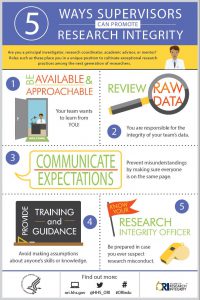1 Comments
Upholding the integrity of scientific research takes contributions from scientists, trainees, administrators, and policymakers alike. A new infographic from the Department of Health and  Human Services Office of Research Integrity (HHS ORI) shares five tips that supervisors can take to promote research integrity in their workplaces:
Human Services Office of Research Integrity (HHS ORI) shares five tips that supervisors can take to promote research integrity in their workplaces:
1. Be Available and Approachable – Take the time to cultivate a relationship with your trainees. They are there to learn from you, so discuss progress and problems in an open and constructive manner. This can encourage conversation, promote transparency, and make them more comfortable coming to you with questions or concerns.
2. Review Raw Data – You are responsible for any data put forth by your research group. Regularly reviewing raw data, especially results related to any paper, grant, or poster; this can help catch both honest errors and intentional manipulations before they get out your door.
3. Communicate Your Expectations – Be clear about individual roles and responsibilities regarding experiments, data management, authorship, and timelines of projects, as well as how trainees will be evaluated. Consider adopting a formal onboarding process and posting written standards in the lab.
4. Provide Training and Guidance – Not all trainees will arrive with the same skill level. Avoid making assumptions about anyone’s prior knowledge by regularly reviewing protocols, proper use of equipment, and data storage and management.
5. Know Your Research Integrity Officer (RIO) – Be prepared in case you ever suspect research misconduct. Find out now who the RIO is at your institution and share their contact information with your research team.
Click the thumbnail to download a PDF of this infographic, and share this article with your colleagues!



Would it be possible to get an editable version of this document? We’d love to widely distribute this as part of our RCR communications but thought we would like to edit the small “Find Out More” box to include our Research Protections office social media info instead and also include the name of our research integrity officer.